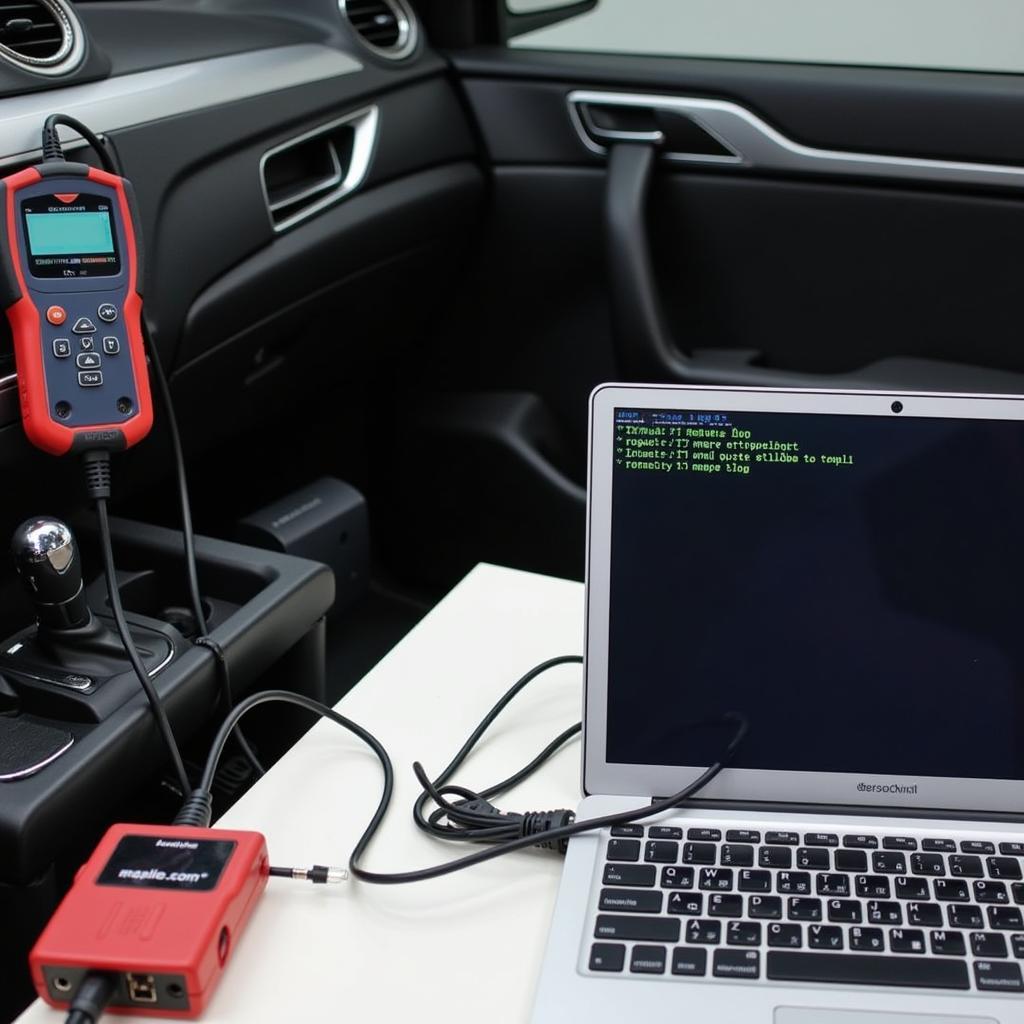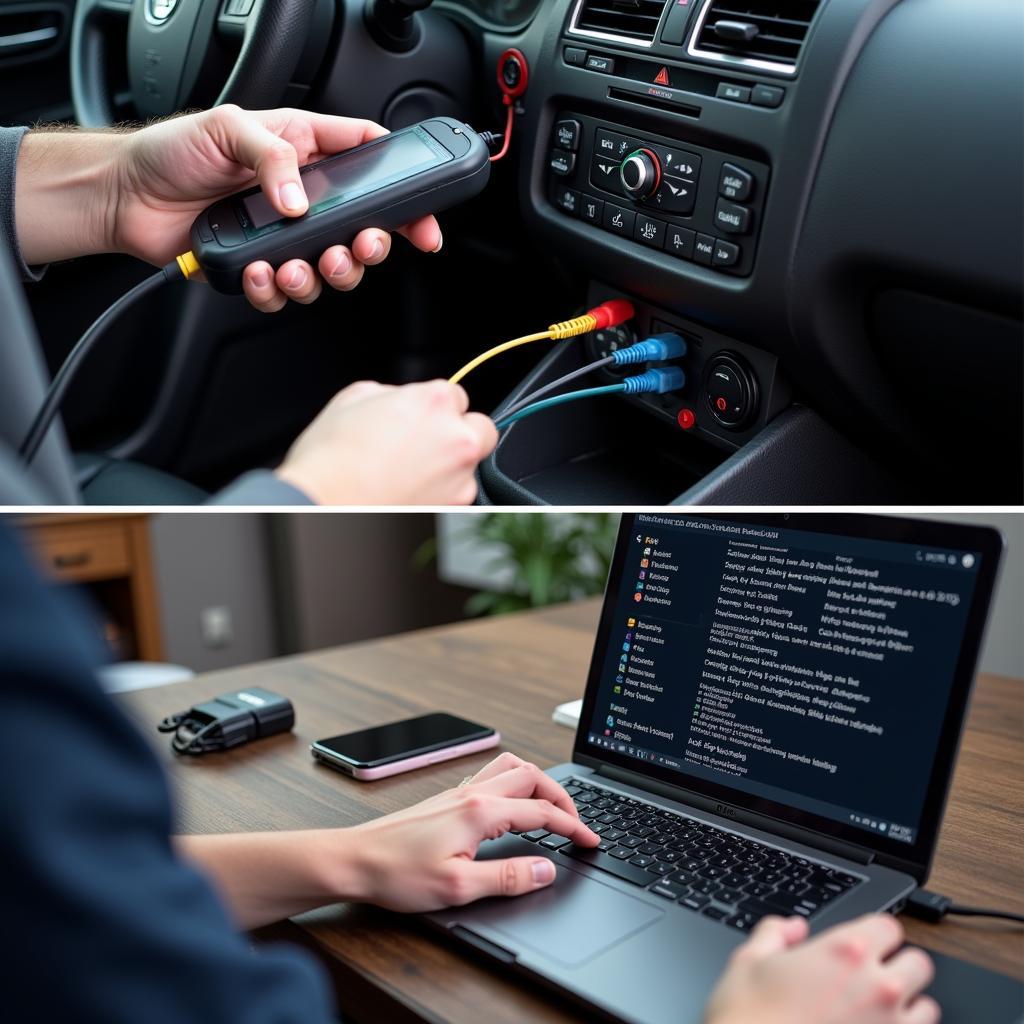Connecting a scan tool to your vehicle’s onboard diagnostic system (OBD) port is usually a straightforward process. However, when Linux comes into play, things can get a bit more technical, especially when dealing with the ttyusb0 device. Understanding how to utilize the scan tool linux ttyusb0 effectively can unlock a wealth of diagnostic information, enabling you to pinpoint and resolve vehicle issues efficiently. This guide provides a comprehensive overview of using scan tools with the Linux ttyusb0 device, offering practical tips and troubleshooting advice.
Understanding the Linux ttyusb0 Device
The ttyusb0 device in Linux represents a USB serial port. When you connect a USB-based scan tool to your Linux system, it often gets assigned this designation. This device node essentially acts as the communication gateway between your scan tool and the Linux operating system. Knowing how to interact with ttyusb0 is crucial for effectively using your scan tool.
Why ttyusb0 Matters for Scan Tools
The ttyusb0 device is vital because it allows the scan tool software running on your Linux machine to communicate with the vehicle’s ECU (Electronic Control Unit). This communication channel enables you to retrieve diagnostic trouble codes (DTCs), monitor live data streams, perform actuator tests, and execute various other diagnostic functions.
Setting Up Your Scan Tool with Linux ttyusb0
Connecting and configuring your scan tool with Linux ttyusb0 involves a few key steps. First, ensure you have the necessary drivers installed for your specific scan tool. Next, connect the scan tool to your vehicle’s OBD port and then to your Linux machine via USB.
Installing Necessary Drivers
Different scan tools may require specific drivers to function correctly with Linux. Consult your scan tool’s documentation to determine the appropriate drivers. You can usually install these drivers using the Linux package manager or by compiling them from source.
Connecting the Scan Tool
Physically connect your scan tool to the OBD-II port located under the dashboard of your vehicle. Then connect the other end of the scan tool cable to a USB port on your Linux computer.
 Connecting Scan Tool to Linux via ttyusb0
Connecting Scan Tool to Linux via ttyusb0
Configuring Permissions
After connecting the scan tool, you might need to adjust the permissions for the ttyusb0 device to allow your user account access. You can usually achieve this using the chmod command in the Linux terminal. For example, sudo chmod 666 /dev/ttyusb0 grants read and write permissions to all users.
Using Scan Tool Software with ttyusb0
Numerous open-source and commercial scan tool software packages are available for Linux. Choosing the right software depends on your specific needs and the capabilities of your scan tool.
Popular Scan Tool Software Options
Some popular options include ScanTool.net, which offers a web-based interface, and OBDTest, a command-line tool. These tools can communicate with the ttyusb0 device and provide access to the vehicle’s diagnostic data.
Communicating with the ttyusb0 Device
Most scan tool software will automatically detect and connect to the ttyusb0 device. However, you might sometimes need to specify the device manually in the software’s settings.
Troubleshooting Common Issues
Encountering issues while using a scan tool with Linux ttyusb0 is not uncommon. Here are a few troubleshooting steps to address common problems.
Permission Problems
If you experience permission errors, ensure the correct permissions are set for the ttyusb0 device using the chmod command as described earlier.
Driver Issues
If you suspect driver problems, try reinstalling or updating the drivers for your scan tool.
Connection Problems
Check all physical connections between the scan tool, the vehicle’s OBD port, and your Linux machine. Ensure the cables are securely connected and undamaged.
Conclusion
Mastering the scan tool linux ttyusb0 can empower you to perform advanced vehicle diagnostics efficiently. By understanding the role of ttyusb0 and following the steps outlined in this guide, you can unlock a wealth of diagnostic information and troubleshoot vehicle issues effectively. Remember to consult your scan tool’s documentation for specific instructions and compatibility information. Using a scan tool with Linux ttyusb0 opens up a world of possibilities for DIY car maintenance and repair.
 Troubleshooting Scan Tool Connection on Linux ttyusb0
Troubleshooting Scan Tool Connection on Linux ttyusb0
FAQ
-
What is ttyusb0 in Linux? It’s a device node representing a USB serial port, commonly used by scan tools.
-
How do I connect a scan tool to Linux? Connect it to the vehicle’s OBD port and then to your Linux machine via USB.
-
What software can I use with a scan tool on Linux? Options include
ScanTool.netandOBDTest. -
How do I fix permission issues with ttyusb0? Use the
chmodcommand in the terminal, for example,sudo chmod 666 /dev/ttyusb0. -
What if my scan tool isn’t recognized by Linux? Check driver installation and physical connections.
More Information and Support
Need more help? Check out our other articles on automotive diagnostics and scan tool usage. If you require personalized assistance, our expert team is here for you 24/7. Reach us via WhatsApp: +1(641)206-8880, Email: [email protected] or visit us at 276 Reock St, City of Orange, NJ 07050, United States.


